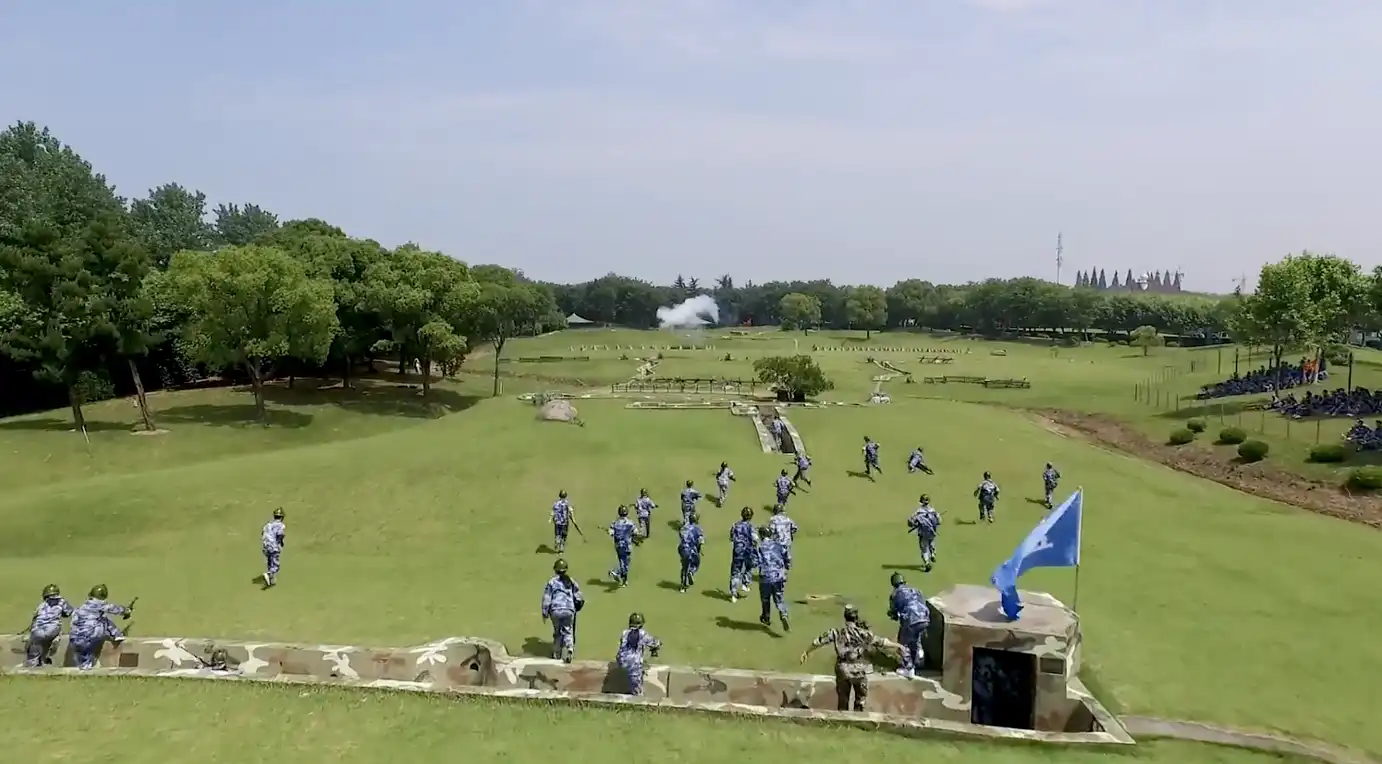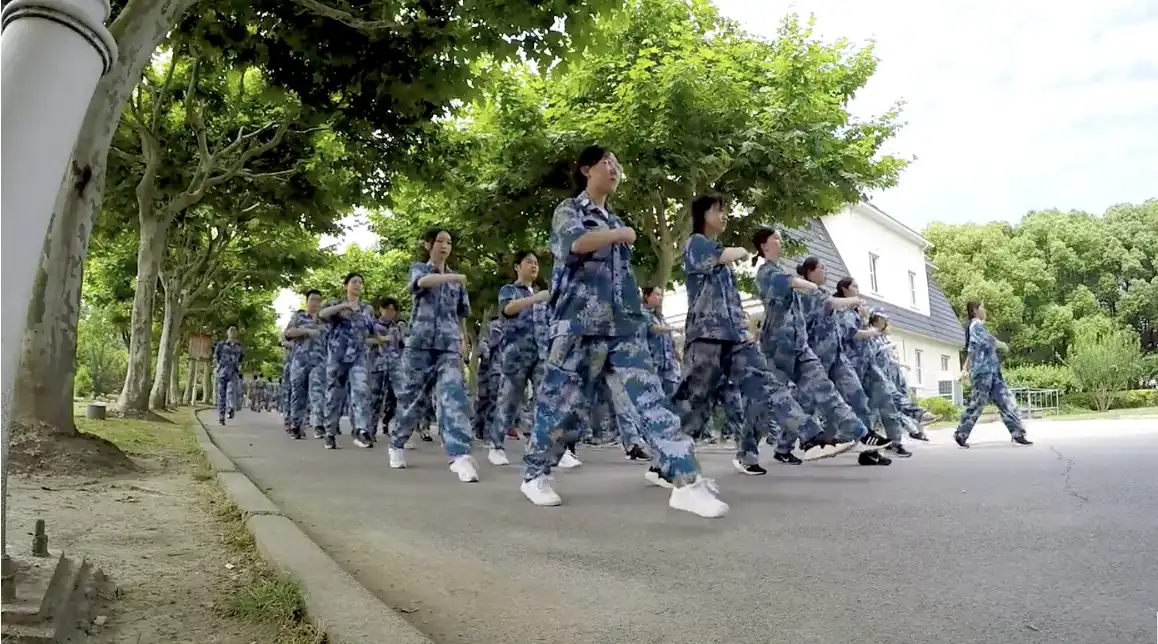Beyond Campus, How Military Training Influences Student Life
Five students from these countries talked about the meaning to them of national service in their home country, including Gloria Guo and Xinze Li from China, Ninad Mukherjee from Singapore, Minjae Lee from South Korea, and Eli Levi from Israel.

Each NYU Shanghai Chinese freshman has to undertake annual military training organized by the school. Some international students face mandatory national service at home. As they deal with the challenges of life on campus, military training has an imperceptible influence on students’ lifelong development.
Students from more than 80 countries populate the multi-cultural NYU Shanghai campus, many of them required to undertake national military training. However, at NYU Shanghai, you might never realize how the military training experience influences your everyday life.
“Military training is a part of my identity,” Hammond Liu, a junior from Tianjin, China, said proudly.
Five students from these countries talked about the meaning to them of national service in their home country, including Gloria Guo and Xinze Li from China, Ninad Mukherjee from Singapore, Minjae Lee from South Korea, and Eli Levi from Israel.

NYU Shanghai Chinese Student Military Training
Under China’s Military Service Law,long-term national service is voluntary. This means Chinese citizens don’t have to serve in the army for years or receive soldier’s professional military training.
But Chinese universities have an obligation to provide a short-term military training program for all freshmen with the help of the local army. It usually takes 1-2 weeks and covers basic military skills and national defense education. As a Sino-American university, NYU Shanghai is no exception.

NYU Shanghai Chinese students during military training Credit:
At the end of each spring semester, Chinese freshmen will go to Oriental Land in Qingpu District, Shanghai, to finish a 10-day mandatory military training program. Students from Hong Kong, Macau, Taiwan and other countries and regions are welcome to join.
Kathy Song, a junior from New York, is motivated to join Chinese students in their military training “I don’t get the experience [of military training] in the U.S. [Seeing] so many students have military training in their countries, I want to have that experience,” she said.
Fluency in Chinese language is a key factor in the school’s assessment of non-Chinese applicants as all training is done in Chinese. “To get approved, you just need to speak Chinese and understand the commands,” Kathy said.
NYU Shanghai takes full advantage of the various military resources at Oriental Land, said Judy Li, Assistant Dean of Students at NYU Shanghai and director and organizer of Chinese students’ military training. It offers comprehensive and systematic military training for participants, including using live ammunition, field camp experiences and survival training, she said.
“Because of their limited facilities and huge student numbers, [other Chinese universities] simplify their military experience into parade training, which is easy to practice,” Li added.

Left: Using live ammunition during Chinese military training. Credit:
Right: Students prepare for a military training gala. Credit: Jennifer Yao
For training, the student cohort is divided into several units of about 50 students each. The students work together doing exercises, sharing meals and sleeping under the same roof. Each unit has two student leaders, or company representatives.
Through the program, Li expects students to develop a sense of collective and group pride, which are important values in China education.
“Everyone needs to contribute to the collective and, conversely, everyone will benefit from the collective,” she explained.
Prior to joining NYU Shanghai, Li worked for East China Normal University, a traditional institution where students study in a fixed “class,” or cluster of classmates, assigned by the school for their four years of education. This builds a strong sense of collective identity, she said.
Li believes the sense of collective is understated at NYU Shanghai because of a different administrative structure but she expects Chinese students to regain it during military training.

NYU Shanghai Chinese student during marching training Credit:
Apart from a sense of collective, will power and tenacity, other characteristics are developed by participants which will benefit them through life, even after they leave NYU Shanghai, Li said.
“Parade marching training requires standing in a soldier’s posture for 30 minutes or one hour. It looks boring and it is boring but if you think more deeply it is actually developing will power and tenacity,” she said.
Gloria Guo, a sophomore from Guangzhou, is a student leader during the military training in May and she believes in its values.
“As an activity emphasizing the sense of collective honor and collective cohesion, military training can give us an opportunity to get to know people around us and strengthen the bonds between peers,” Guo said. “This activity is already very meaningful.”
Xinze Li, a senior from Lanzhou, was a student leader during military training two years ago.
“In our school, not every student is willing to accept [military training]. [Some students] may think it is a bureaucratic facade. Before departure, I was kind of worried about the students and we hoped to help them embrace the activity, or at least spend the 10 days happily,” Xinze said.
During the training, Xinze felt his leadership skills were strongly developed through mediating conflicts.
“Every year of military training, there will be conflicts among students themselves, and between students and teachers. Our starting point was to represent the interests of students, or as student representatives to help students solve problems,” he said.
Gloria Guo has a similar expectation about her student leader’s position during training.
“I hope to play a mediating role and build a bridge for communication between the school [administrators] and the student cohort,” she said when discussing her expectations.
National Service in Singapore
Ninad Mukherjee, a sophomore/junior from Singapore, learned a lot from his military training stint in Singapore. “The most important was soft skills, how to be a good leader, how to be resilient, how to deal with lots of bad times,” Ninad said.
“We call it national service in Singapore. The concept is that every male [...] needs to serve in the military, as a form of service to the country.”
Before attending NYU Shanghai, Ninad spent two years in the army completing his national service. It wasn’t all smooth going, Ninad said, especially his experience of throwing hand grenades which “was really scary.”
“The moment [I] pulled the pin out, the grenade became alive, and I was holding it in my hand before throwing it. If I f***[ed] this up, I [was] going to blow myself up. That is kind of what I mean [by] real fear.”
Ninad said that learning how to deal with pressure in two years of army national service helped with his academic life at NYU Shanghai. “I learned to deal with much more serious pressure. Being here, I don’t really feel it is the same. I know how to deal with [the school pressure], what I need to get done,” he said.
Military Training in South Korea
Sophomore Minjae Lee plans to take a leave of absence for 18 months, or three semesters, and start mandatory military training at home in South Korea to fulfil his national duties.
“In Korea, all men who are fit need to do military training, usually for 18 months,” Minjae said.
“Everything is strict. You have to eat at the exact same time. And at first, you have to do some training and work every day,” he said. There are strict rules, and policies on smart phone usage, visiting families and friends.
Minjae did not grow up in South Korea, having left at the age of seven. He hopes the military experience of being immersed in a bubble of only Korean people will help him to learn more about his homeland’s society and culture.
National Service in Israel
Israeli Eli Levi, a non-NYUSH undergraduate student in Shanghai, is looking forward to joining his country’s military service upon graduation from college and then spending four years in the military. He believes the experience will have a positive influence on his postgraduate studies in law school and further career development.
“Israeli is one of the very few countries in the world [that] has mandatory military service for both male and female citizens,” he said.
Israelis have a strong passion for national service and the participation rate is very high. The society has a military culture formed by necessity to defend the homeland due to long-standing historical and geopolitical issues.
“I have heard stories of soldiers who are handicapped or in wheelchairs who insist on serving in the Israel Defense Forces”, Eli said.
During national service, Eli expects to develop more community service experience and sense of duty in preparation for his future political career plans.
Judy Li is convinced about the value to Chinese students of the military training experience.
“We often joke that students often cry at the start because they don’t want to participate. But they really do cry when they finish it. Looking back on 10 days experienced with their peers, students feel reluctant to say goodbye,” Li said.